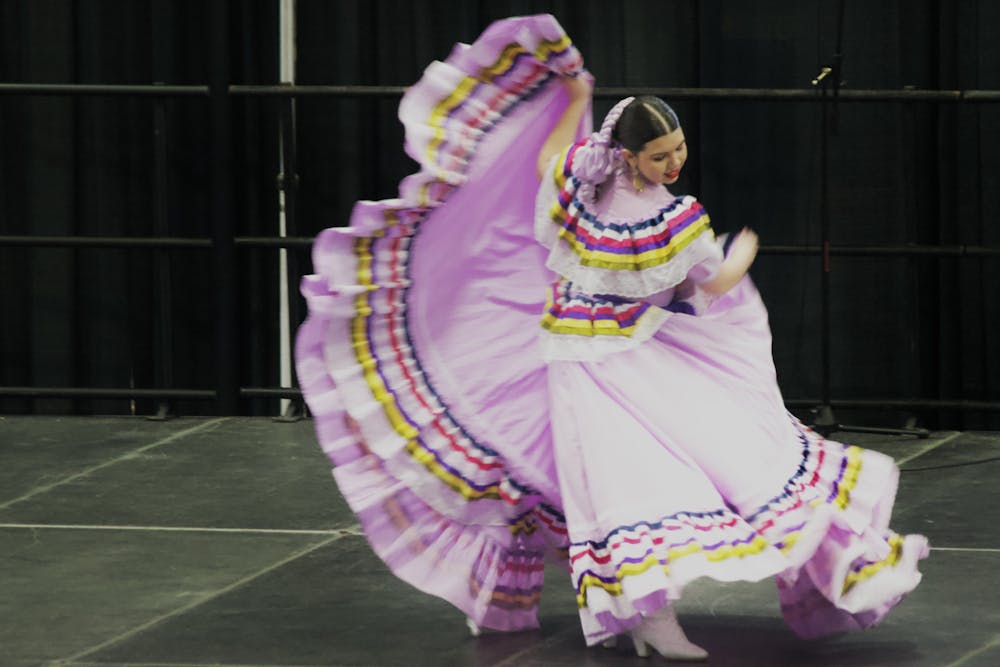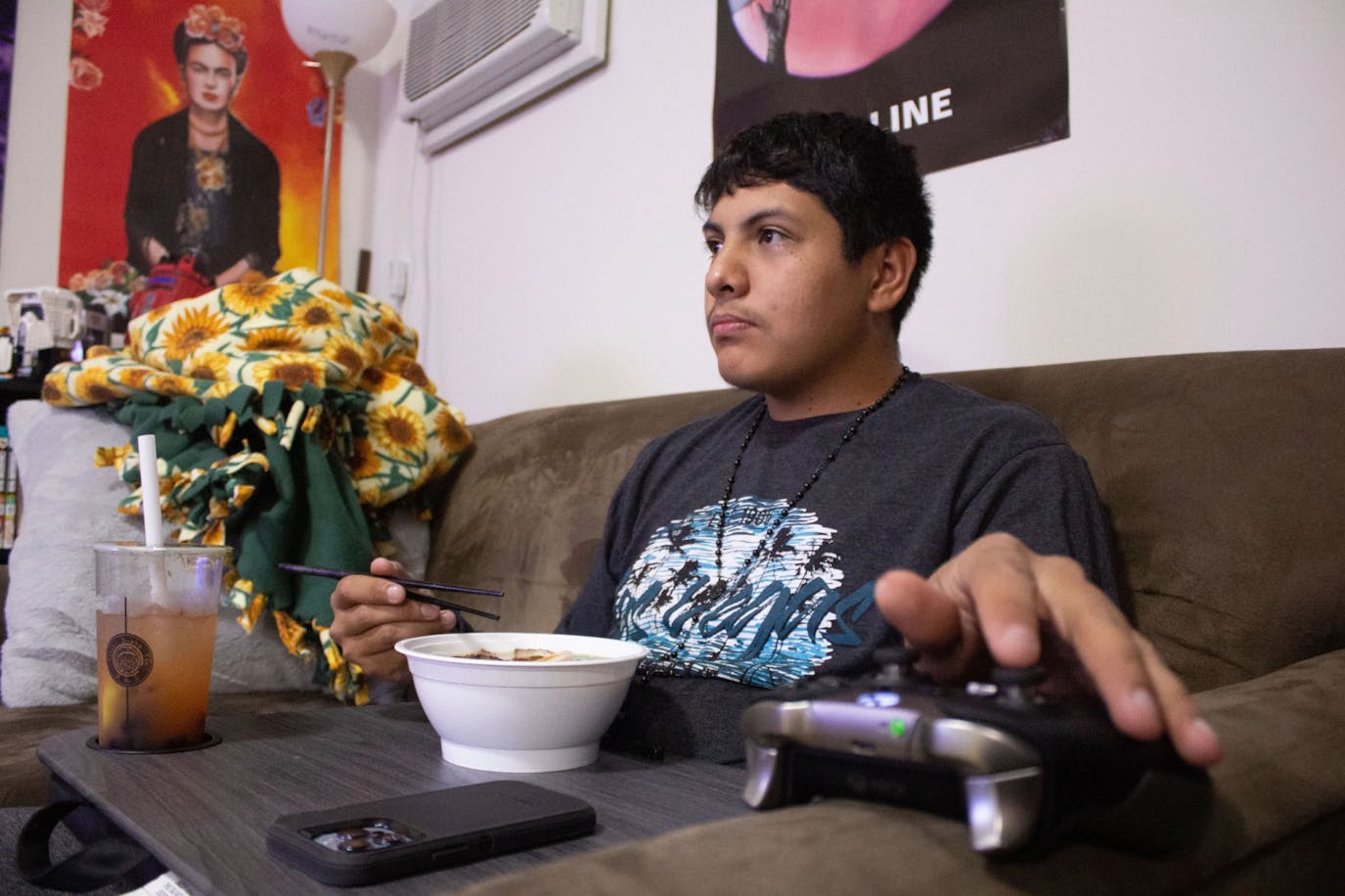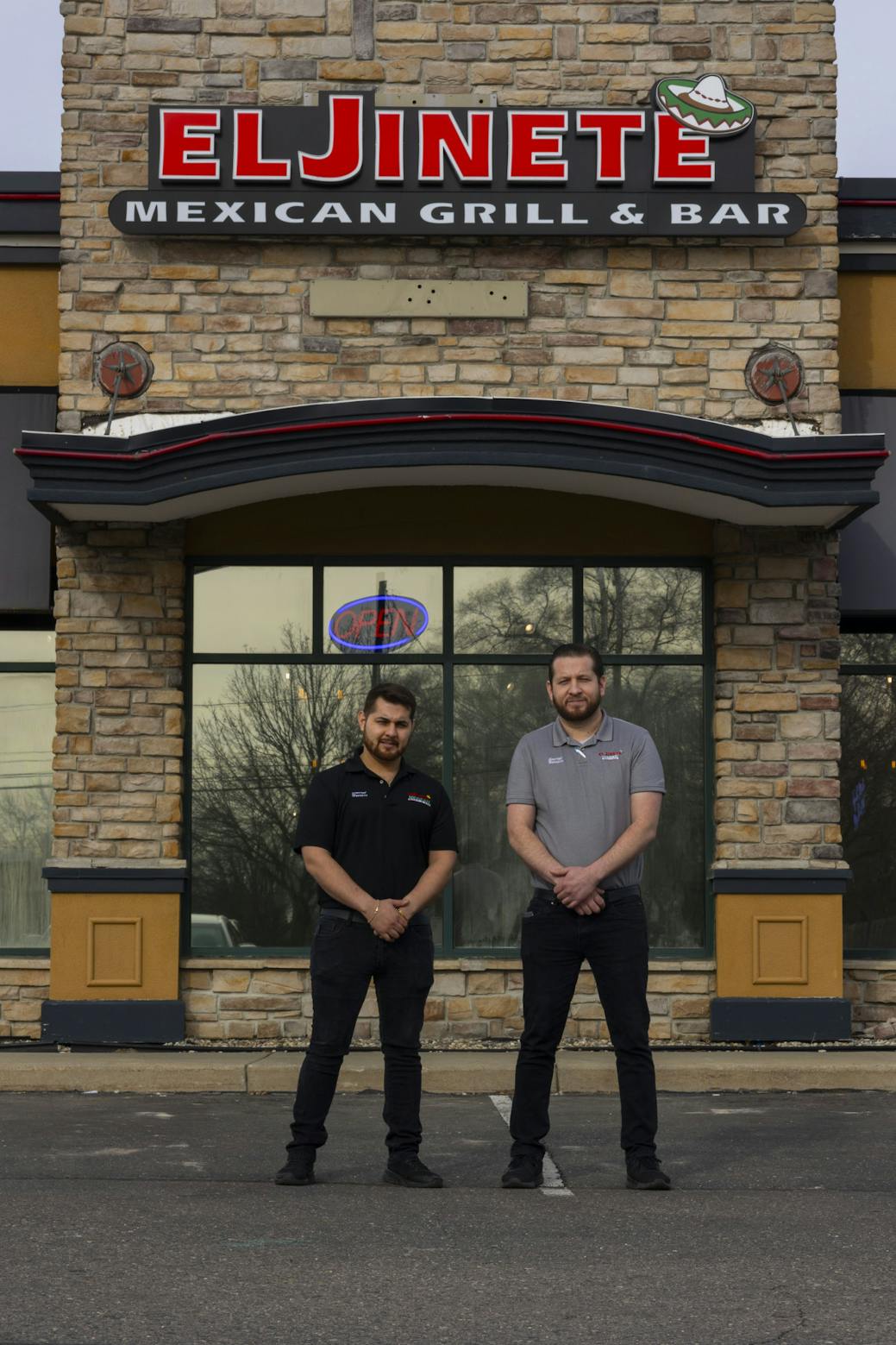'It's what you leave behind'

CMU senior and President of Ballet Folklorico de la Luz, Regina Araujo-Pedroza performs at Spring MainStage on Friday, Jan. 26, in Finch Fieldhouse. (CM-Life | Soli Gordon)
Central Michigan University is home to over 500 Hispanic undergraduate students, according to a data report from 2022. As a result, these students bring their culture to the Mount Pleasant community and establish connections with others in the community.
Four people in the area have done just that. Central Michigan Life spoke with these people to learn what their culture means to them and how they have become staples of the community.
Dance can be ‘moving’: Regina Araujo-Pedroza
Regina Araujo-Pedroza is a senior at CMU and the president of Ballet Folklorico de la Luz, a registered student organization on campus known for its performances at campus events, such as at cultural festivals and Rock Rally.
“When I get on stage, I feel more confident than in everyday life,” she said.
Araujo-Pedroza grew up in Royal Oak, Michigan. While her father came from Guanajuato, Mexico, she said he didn’t teach her much about her culture as he didn’t want her to face the same discrimination he did.
“When you’re a kid, you don’t know much about race, it’s taught to you,” she said. “My mother was the one to make sure I never lost that part of my identity.”
When she was 6 years old, Araujo-Pedroza learned classical ballet, but she said it never felt like it fit her. At 14, she attended a talent show called the “Annual Show for Blue Lake Fine Arts.” It was here she watched a woman perform the Folklorico style of dance, and she said it moved her to tears.
“It was the first time I felt so emotionally connected to my culture,” she said.
From there, Araujo-Pedroza started researching the style of dance and where it originated, in which she found it was a state close to her father’s birthplace.
Her parents noticed her interest and were able to get her lessons in another area of Detroit. Within months, she went from beginner level classes to advanced placement classes.
“When I perform, I feel like a different side of me is unlocked,” she said. “I feel a special connection to it. It’s a way for me to connect to my relatives in Mexico all the way from Michigan.”
When Araujo-Pedroza arrived at Central, she knew she wanted to start a dance group. Despite the trials of starting in the heart of COVID-19 pandemic, she built up the RSO and taught the members everything she knew about Folklorico.
“My dancers inspire me every day,” she said. “I feel like a family with them, because they’ve all gone through similar things as me with our culture.”
She also said their performances take inspiration from Jalisco and Baja-California, and their costumes, or vestuarios, are inspired by it as well.
“We wanted to make it represent the region(s) but not take away from it,” she said.
She designed the dress herself, sketching it out and working with a seamstress to bring it to life.
The dress is adored with ribbons from the indigenous culture of Mexico, and there is a garment in a middle called a rebozo, which resembles a shawl or scarf and she said it’s a prized possession to women in Mexico.
“Women who own one tend to have them for life,” she said.
The dress also has buttons on it inspired by the ones on male dancer’s pants, which tend to decorate the sides of the pant leg. On the dress, they serve as collar buttons.
Araujo-Pedroza said that the group isn’t just open to Hispanics, but to all races and ethnicities. She said it’s never too late for anyone to learn Folklorico, and many of her dancers started with no knowledge whatsoever and worked their way up.
“This is one of the biggest ways to show cultural appreciation to me,” she said. “It doesn’t matter who you are. Don’t let anyone tell you what to do or who you should be… Don’t let them taint your perception of yourself.”
Araujo-Pedroza is set to graduate in May of this year, and she said that her other dancers will be able to take on more leadership roles in the club once she does.
“It has been a wonderful four years,” she said. “My biggest hope is that they continue the legacy, and I’m excited to see what they do.”

Leo Jurado eats food and watches 'Chainsaw Man' in this October 2022 file photo at Copper Beach Apartments. (CM Life photo | file | Nico Mendoza)
Connected with nature: Leo Jurado
Uncle John’s Cider Mill is a family farm located in Saint Johns, about an hour south of Mount Pleasant.
The farm relies on apples, growing six different types along with other crops, and uses them to make cider, pies and more. The farm accomplishes this with the help of its permanent and temporary Hispanic workers.
Leo Jurado, 20, is an electrician apprentice working in Riverdale, Michigan. In his youth, he was one of the permanent residents at Uncle John’s Cider Mill and has fond memories of the place.
He said his parents are the main ones working there now, with his father being a supervisor and his mother being a field worker. He shared that they immigrated from Chihuahua and Mexico City respectively before he was born, and he was the first child of theirs to be born in the United States.
“My parents didn’t really teach us our Mexican culture and roots,” Jurado said. “They wanted to make sure we had enough. I wouldn’t say the bare necessities, a little more than that. We weren’t struggling, but we worked to obtain the kind of life we had.”
He said he has five other siblings, and they all started working on the farm when they turned 13 years old. He would do chores on the farm, such as harvesting, planting and pruning crops like blueberries, apples and pumpkins. They also helped decorate and set up fences for parking for upcoming events.
“We’d probably start planting in about May or June,” Jurado said. “Harvesting season wouldn’t end until mid-November, early December range.”
He said that although his parents owned a trailer about 40 minutes away, they lived on the farm for convenience in a building known as “the cabin.” He described it as two buildings spilt in half, with two bedrooms and a kitchen and living room combined. While him and his family had one area, migrant workers who came temporarily would live in the other areas.
Jurado said his family was the “main” permanent family on the farm compared to the migrant workers that came and went. As a result, he said they had a close bond with the owners of the farm. He said the owners helped his family eventually buy a house within Saint Johns.
“I’ve always been around them since I was a little kid,” he said. “I would say I have a really good understanding of their family and they have a really good understanding of mine.”
Jurado said he had some fond memories with his family on the farm, and one thing he liked the most was the time between planting and harvesting seasons.
“I always enjoyed watching the apples blossom, I think it’s very pretty,” he said. “I feel like I’m very connected to nature with the amount of time I would spend outside in it.”
While he said he disliked doing the chores as a child, he is grateful for the upbringing he had because it shaped him into the person he is today.
“Without all of us contributing and helping my parents, I don’t know if I would have the life I do now,” Jurado said. “I have a lot of trust in my family. I noticed my family is a lot closer than other families I’ve met… And I’m grateful for that, cause not everyone can say that.”
Spicing things up: Jose and Luis Torres

Mount Pleasant is home to a variety of restaurants, including two sister restaurants owned by two brothers.
Los Aztecas is a Mexican grill and bar restaurant, described by the owners as being colorful and attracting a louder, rowdier crowd, as compared to its younger sister restaurant, El Jiente, which is said to appeal to older residents and is a more formal environment.
Both businesses are co-owned by Jose and Luis Torres, 36 and 31 respectively. They are two of the oldest siblings out of a set of 12, with five other brothers and five sisters. Born in the state of Jalisco, Mexico, they said their family had been in the restaurant business since the 1980s, with their father starting out at a restaurant in Atlanta, Georgia.
It wouldn’t be until they each turned 16 that they started working at restaurants in America. Luis said he remembers having to work his way up from a busboy to a dishwasher to eventually a cook. Ten years later, he now owns his own restaurant.
“It’s easy when you love food and love working in this environment,” Luis said.
Jose said he originally was on vacation to Mount Pleasant when a friend of his offered to show them the building Los Aztecs is now in. He saw the potential in the place and took the leap to open his own restaurant there.
It did so well that they were able to open their sister restaurant, El Jiente, in a building that was formerly a Ruby Tuesday and completely renovate it into what it is today.
“Sometimes we think about it and just don’t believe it,” Luis said. “He’s (Jose’s) not afraid of failing. He’s always said our head will get us places, and it has. We just have to stay focused and positive even in hard times.”
Jose said their businesses thrive due to their experimental cooking style. He said they are never afraid to try new recipes and bring classic dishes from their family teachings onto the menu. Some of these dishes include their birria (a type of Mexican stew), their tacos inspired by traditional Mexican street tacos, and a three pound burrito called burrito gigante.
“We have a variety of dishes around that others don’t,” Jose said. “We want to blow people’s minds and taste buds... We take pride in that.”
“Not all restaurants are willing to try new things,” Luis said. “We like to see what’s trending and adapt.”
The brothers said they use their restaurants to give back to the community and local schools. Luis said they have catered food for CMU athletes, and Jose said they donated food to a family after a deer broke into their home a few months ago. They both agreed that they value the connections they’ve made with people through the business more than anything.
“The local support is great,” Luis said. “Our regulars go back and forth between restaurants. They know us by name and even know our families.
“It doesn’t feel like work. It’s like they say: When you choose what you love, you never work a day in your life.”
Jose said that he's grateful to be part of the Mount Pleasant community, and that his business can contribute to it.
“It’s not about the money,” he said. “It’s what you leave behind. It’s what you bring to your town and family, and I’m grateful for all of it.”
They said they have high hopes for the future of the business, and are hoping to establish connections with Hispanic RSOs at CMU like Ballet Folklorico de la Luz. They are also considering opening a third restaurant closer to Midland.



